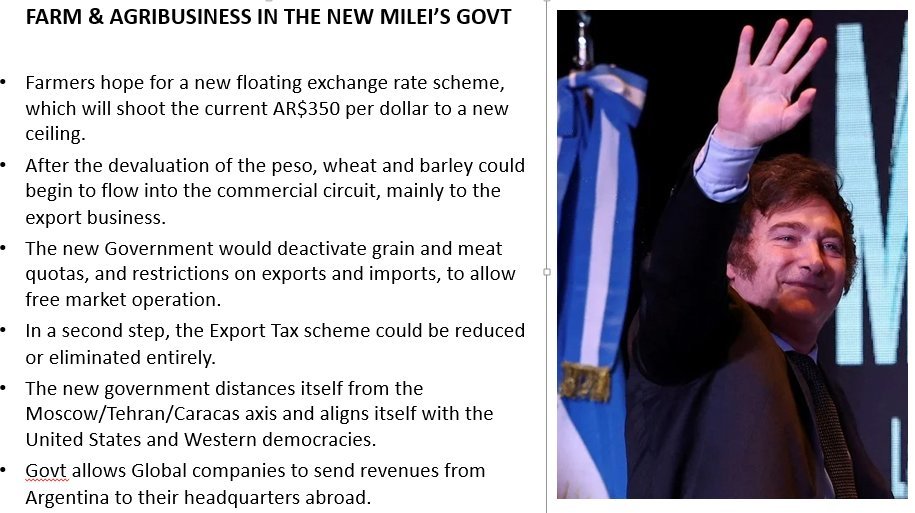What you need to know: Argentina post-election discussion
Easy Newz discussed with former Undersecretary of Agriculture and Argentina export Javier Preciado-Patiño. You can follow him on X here.
The new president represents a resounding vote against the current government and decades of mismanagement and corruption. The margin of victory at 11% is significant because it helps provide the new government with a mandate from the people, something most thought would be lacking for whoever emerged victorious.
Uncertainty is going to be the central theme well into 2024
-Javier Milei has yet to experience running a company, government, or large organization. Who he will appoint and how he will rule are complete unknowns. Selecting officials from the previous Macri administration could provide stability versus complete outsiders.
-Argentinians care deeply about social issues. There is a tradition of giving the new administration a chance. This is why the 11% margin was critical. The rhetoric cannot be divisive and antagonistic. Outsiders expecting protests may be disappointed if President Milei can find his footing quickly and get control of the economy.
-The business administration (not necessarily agriculture) wanted Massa because of his predictability. There are entrenched unions and interests that will need to buy in. There are also existing relationships with agriculture. Milei’s camp is aligned with grain industry organizations and Massa was with the oilseed. This makes a quick elimination of oilseed export taxes less likely.
The pillars of Milei’s plans are as follows:
-Free market and opening Argentina. He has already announced plans to privatize the state-owned oil company YPF. All industries and businesses get the same treatment.
-Dollarize the economy (see painful adjustment comments below), including merging the currency to a floating rate.
-Cut taxes and eliminate the state control of industries, including privatization and incentivizing foreign direct investment (FDI) again.
The many currency rates are effectively taxes in a different costume. Merging to a single currency is going to be painful for the domestic economy. Here is an example of wheat and bread.
Wheat sells for 100,000 pesos per tonne, and bread sells for 1,000 pesos per kilo. This is priced domestically at the official rate of 350:1. The unofficial rate is currently 950 and is expected to devalue rapidly. The domestic consumer cannot deal with the price of staple goods tripling. This adjustment will need to be managed carefully.
Debt is the most significant question mark in the near term
It is no secret Argentina owes a lot of money. Domestic companies owe $20 to 40 billion on unpaid imports. The government owes over $30 billion to the IMF, with monthly payments of $1 to $2 billion. Internally, the debts are multiples of these numbers. The EU provided a debt restructuring election preview.
Milei’s disdain for the central bank is no secret. The central bank has weaponized access to dollars to control reserves. The central bank prints money to keep the economy running. This is the cycle that fuels inflation. Milei does not look fondly on China’s form of government, so it is not clear how this relationship will evolve.
Central banks are divided into four categories: the bad ones, like the Federal Reserve, the very bad ones, like the ones in Latin America, the horribly bad ones, and the Central Bank of Argentina.
-Javier Milei (President Elect)
Agriculture specific challenges
Export taxes may be complicated depending on who is selected as Secretary of Agriculture. Tax removals may have to happen in steps if the government debt restructuring needs to keep reserves above a certain level.
IP seed protection is going to be a hot topic. This is a significant constraint on boosting soybean yields. Upwards of 40% of soybeans are black market seeds. Macri was unable to address this as the farm organizations pushed back. A big step to winning back investment will be proving IP protection can be enforced.
Opportunities for a brighter future
Expect it will take 12 months. Commodity processing and added value businesses will help the country realize its full potential: biofuels, low-carbon and sustainable production, livestock, and aquaculture (to name a few). Easily accessible lithium and shale energy are already attracting foreign ownership.
In summary, the land is too cheap and production margins without onerous taxes will make Argentina a low-cost producer again. With some fundamental reforms, the commodity economy is ready to take off like a rocket and set the tone for the broader economy.
One caveat: we expect most companies to observe the transition period before they are again willing to commit significant capital to Argentina. Early investors will have much more upside but deal with a much higher-risk environment. Argentina has burned companies in the past and they will move much slower this time.
First days of planting for the 2023 campaign. Organic sunflowers in southern Cordoba and La Pampa.
Easy Newz contributors farm and engage in business in Argentina. We are not Latin American tourists looking for clicks or filling space on a page. Ignore most of what you read about how Argentina will be governed or Western narratives about “socialism” and Donald Trump. It is just wrong and often misleading.
Argentina is experiencing its most widespread political pushback since the emergence of Peronism in the 1950s. The people are not supporting the new President but instead giving him a chance. It is now up to President Milei and La Libertad Avanza to prove they deserve it.



